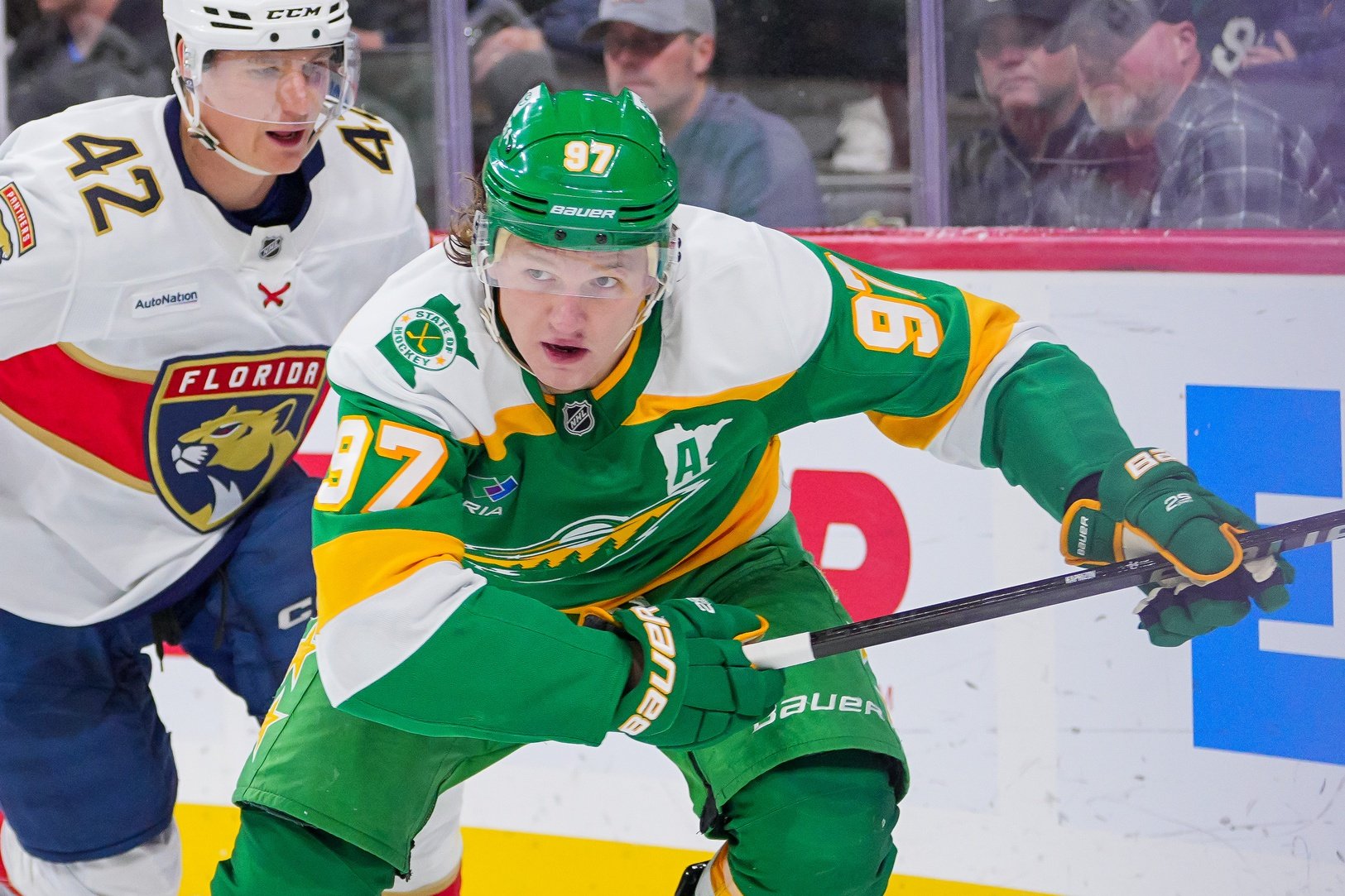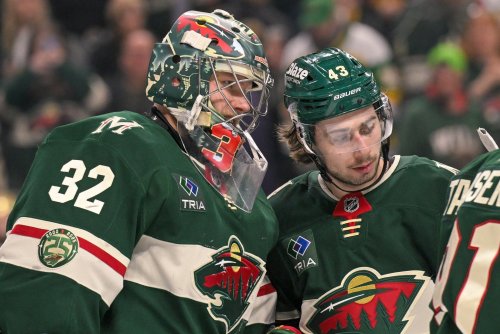
The NHL seems to be in a strange place right now. Offseasons aren’t like the trade deadline, in which there are buyers and sellers. Teams seeking to rebuild usually maneuver for flexibility and culture, and those in their competitive window typically seek to put the finishing touches on their roster.
However, there are usually free agents to feed teams trying to compete, removing some pressure from teams that want to go all-in.
Summer 2025 has a different tone.
Across the league, more teams than usual hold a delusional belief that their year is imminent. Nobody wants to tear it down and rebuild. There’s not even a whisper of the re-tool or on-the-fly rebuild.
The Athletic’s Michael Russo put it succinctly: “League-wide, there are a lot of teams that seem to want to add this offseason but not subtract. And with the cap rising, several teams have the ability to do just that – which may put the Wild in a pickle.”
As with most of this country’s problems, it’s all Washington’s fault.
At the 2023 trade deadline, the Washington Capitals were outside a playoff spot. They looked at their aging roster and 37-year-old superstar Alexander Ovechkin and sold. Washington opened up salary cap space and turned those players into draft picks, then used those two liquid assets (cap space and draft picks) to revitalize their roster.
Under the new leadership of head coach Spencer Carbery, Washington got career years from several offseason additions, including the mercurial Pierre-Luc Dubois. Washington’s 2024-25 could have centered entirely around feeding empty calories to Ovechkin so he could break Wayne Gretzky’s record. Instead, Ovechkin’s record-breaking season put a spotlight on Washington’s division championship, and the rest of the league took notice.
That’s what model organizations do. Perhaps, finally, the rest of the NHL is catching on.
Tanking has been a dubious proposition in the NHL over the past two decades. It’s difficult to study because it’s difficult to define. How does one separate purposeful tanking from ineffective management? And, how would one define success? It’s not easy to put a number on how long the theoretical cycle of losing and winning should last.
On the other hand, some teams seemed capable of consistently winning before breaking through to a championship. For decades, it seemed like the Detroit Red Wings created the blueprint. They made the playoffs in 25 straight seasons from 1991 through 2016 and won Stanley Cups in 1997, 1998, and 2002. Those aren’t perfect comparisons to today’s NHL because the league hadn’t instituted a salary cap until the 2005-06 season.
But then, the Wings won again in 2008.
For a more recent example, consider the Boston Bruins. From 2002 through 2008, they missed the playoffs twice and lost in the first round four times. Most Wild fans would tell you that’s a recipe for sustained mediocrity, but the Bruins won one round in each of 2009 and 2010 before winning the Cup in 2011 and a Conference Championship in 2013.
It’s not as if their two playoff misses netted them elite draft position either -- after missing the playoffs in 2006 and 2007, they picked Zach Hamill 8th overall and Phil Kessel 5th. Kessel contributed to winning, but it’s not as if he punched their ticket to a championship. They later traded him for the picks that became Tyler Seguin, Dougie Hamilton, and Jared Knight. Seguin played on the third line of Boston’s 2011 Cup team, and Hamilton didn’t play an NHL game until 2013.
So, who are these tankers modeling their teams after? How did we get here? Examine the Stanley Cup Champions from 2009 through 2018:

Chicago three times, Pittsburgh three times, and Ovi’s Capitals once. Los Angeles won twice, and the Bruins only once. Of those ten Stanley Cups, only the 2011 Bruins didn’t go through some serious pain to acquire elite talent.
Then, look at the runner-ups. None of those teams got a crack at the coveted talent like Sidney Crosby, Patrick Kane, or Ovechkin. The closest examples:
- New Jersey Devils defenseman Adam Larsson (4th overall, 2011)
- Philadelphia Flyers forward James van Riemsdyk (2nd overall, 2007)
- Tampa Bay Lightning forward Jonathan Drouin (3rd overall, 2013) and forward Brett Connolly (6th overall, 2010).
- Nashville Predators defenseman Seth Jones (4th overall, 2013)
Those runner-ups have a common thread: They either never tried to get a top-three pick or never selected that elite scoring threat. The closest player to the Crosby/Ovi/Kane tier is defenseman Victor Hedman, whom the Lightning selected second overall in 2009. It took Hedman’s Lightning six years before they even made a conference final.
The lesson is clear: good organizations can build contenders, but champions tank.
If you don’t think LA qualifies as a tank job, consider the years before their 2012 championship. They missed the playoffs six straight years from 2003 to 2009. They won 33 games per season, including two seasons with fewer than 30 wins.
For context, Minnesota won 39 games in 2023-24, a season that felt like it would never end. They won 35 in the year before they drafted Marco Rossi.
Los Angeles committed to tanking, but Chicago plummeted through some of the ugliest years in NHL history. The Blackhawks missed the playoffs nine of ten seasons between 1998 and 2008. They won 29 or fewer games four times over those ten seasons.
While the franchise played in America’s third-largest market with no salary cap, it subjected Chicagoites to a decade of unwatchable slop. A generation of family pets were born, lived, and died without seeing a Chicago Blackhawks game worth watching.
But, looking back on the 2010s, that’s what it seemed to take to build a dynasty in the Salary Cap era.
Things look different now.

Not a single championship team has presided over cost-controlled top-five draft picks. Even the runner-ups don’t often hold high picks. Dallas’s Miro Heiskanen is the closest thing to it, and Jesperi Kotkaniemi didn’t drive winning for the Habs. Leon Draisaitl and Connor McDavid both got paid before they achieved playoff success. Even still, they’ve fallen twice in a row to a deeper, better-managed roster in Florida.
Colorado is the only successful tank job on this list.
This seems to have awakened the league to the sins of the tank. Washington’s resurgence probably also aided that, especially under the limelight of Ovechkin’s goal-scoring record. Even when it seems easy to tank, teams are a few efficient roster moves away from contention. Stacking those efficient moves together over multiple seasons can be enough to topple the best player in the world -- twice.
So, maybe Minnesota is screwed. In the year when it’s finally time to go all-in, the firesale GMs are nowhere to be found. If the Wild want to contend, the prices are going up. The good news: yesterday’s prices were far too cheap, so Minnesota can still get a fair deal even at those higher prices.
It’s just going to cost more of their future.
Isn’t that the way it should be, though? Sports are about competition. It should be hard to win. Players make incredible sacrifices every day to beat their opponents -- why should organizations be any different? At least for all 32 NHL franchises as a whole, it’s a zero-sum game. At the end of the year, there are only 82 games, four playoff series, and one Stanley Cup to go after.
It would be a travesty if the best way to become a winner was to spend a long time as a loser. If you like cycles of fat years and lean years, study banking or economics.
It’s time to make an inefficient move. Overpay somebody. Trade away too much for a sexy, top-six forward. Mortgage the future to do it.
That’s the new NHL. For a franchise addicted to mediocrity and shying away from sacrifice, the timing of this window may be a blessing in disguise. Even if it hurts to pay the price to compete, the Wild organization doesn’t have much other choice.
Think you could write a story like this? Hockey Wilderness wants you to develop your voice, find an audience, and we'll pay you to do it. Just fill out this form.
-
 3
3
-
 1
1








Recommended Comments
Join the conversation
You can post now and register later. If you have an account, sign in now to post with your account.
Note: Your post will require moderator approval before it will be visible.